-
In over two years, Ukrainian forces have devastated Russia’s Black Sea fleet.
-
In lieu of warships, Ukraine uses unmanned drones and anti-ship missiles to thwart Russia’s navy.
-
The barrage of attacks forced Russia to shift warships away from a prized naval base in Crimea.
Ukraine has inflicted significant damage on the Russian Black Sea Fleet, wrecking many Russian vessels in over two years of war.
Since Moscow launched a full-scale invasion of Ukraine in February 2022, the Ukrainians have destroyed or damaged roughly half of the Russian fleet’s warships, including one submarine, per publicly available information.
Without warships of its own, Ukrainian forces have relied on unmanned maritime drones and long-range anti-ship missiles to hammer Russia’s naval forces.
Dmytro Pletenchuk, a spokesman for the Naval Forces of the Armed Forces of Ukraine, said in a public statement in February that the Russian Navy had about 80 warships at the outset of the war, including large warships, landing ships, submarines, patrol boats, and minesweepers.
“I can say that the Black Sea fleet operations have been greatly complicated, if not paralyzed,” Pletenchuk said at the time.
The attacks have allowed Ukraine to resume grain shipments through the Black Sea, which is central to its economy, and forced the Black Sea Fleet to shift warships away from its prized naval homeport in Sevastopol on the Crimean peninsula.
Several Russian ships that Ukraine claimed to have destroyed have yet to be fully identified, but reportedly among them are Raptor-class patrol boats, a BK-16 high-speed assault boat, Serna-class and Akula-class landing craft, and a Stenka-class patrol vessel.
Here are the Russian warships known to have been sunk or taken out of the fight over the past two years.
March 24, 2022: The Saratov

Commissioned in 1968, the Saratov was a large Alligator-class amphibious landing ship in the Black Sea Fleet. It was reactivated to transport supplies and support the Russian military operations in Syria.
The ship was able to carry about 400 troops, as well as 20 main battle tanks or 45 armored vehicles.
While the warship was docked in occupied Berdiansk in Zaporizhzhia Oblast on March 24, 2022, Ukrainian forces reportedly sank it with a Soviet Tochka-U short-range ballistic missile.
Video of the incident appears to show fire erupting above the wreck of the ship near the port as other Russian warships sail to escape the flames.
April 14, 2022: The Moskva
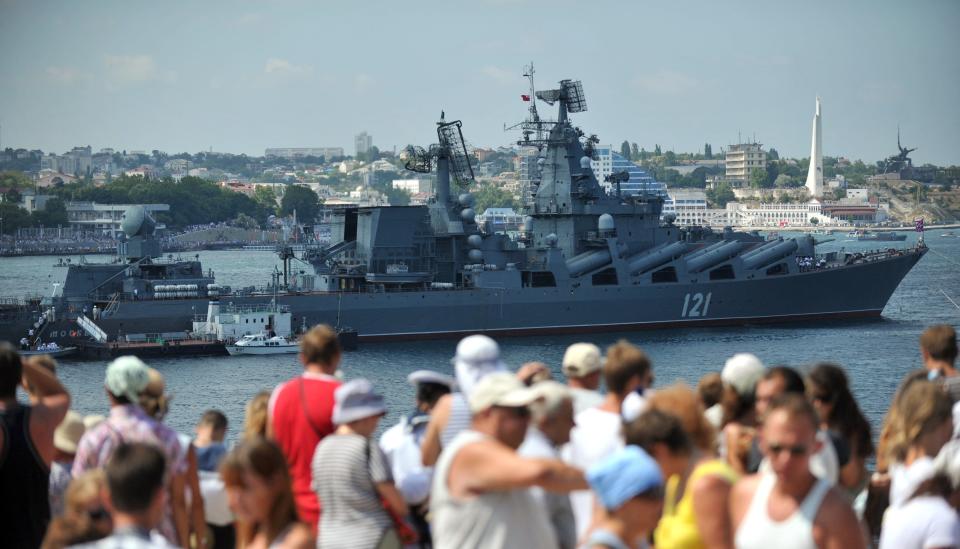

In a significant blow, the Black Sea Fleet lost its flagship, the Moskva, a guided missile cruiser, when it was sunk on April 14, 2022. It marked the first time a Russian flagship was sunk by an enemy since the Russo-Japanese War in the early 1900s.
At the start of the invasion, the Moskva provided air cover for other Russian warships and aided in capturing Snake Island in late February 2022.
Ukraine said it struck the cruiser with long-range Neptune missiles launched from shore.
The 1st video of the Moskva missile cruiser before it sank, if photos posted last night are accurate. It was listing to one side & on fire inside & out, with the area around the bridge burning intensely from what Ukraine says was 2 missile strikes pic.twitter.com/0QpI1tzOrI
— Alec Luhn (@AlecLuhn) April 18, 2022
June 17, 2022: The Vasily Bekh
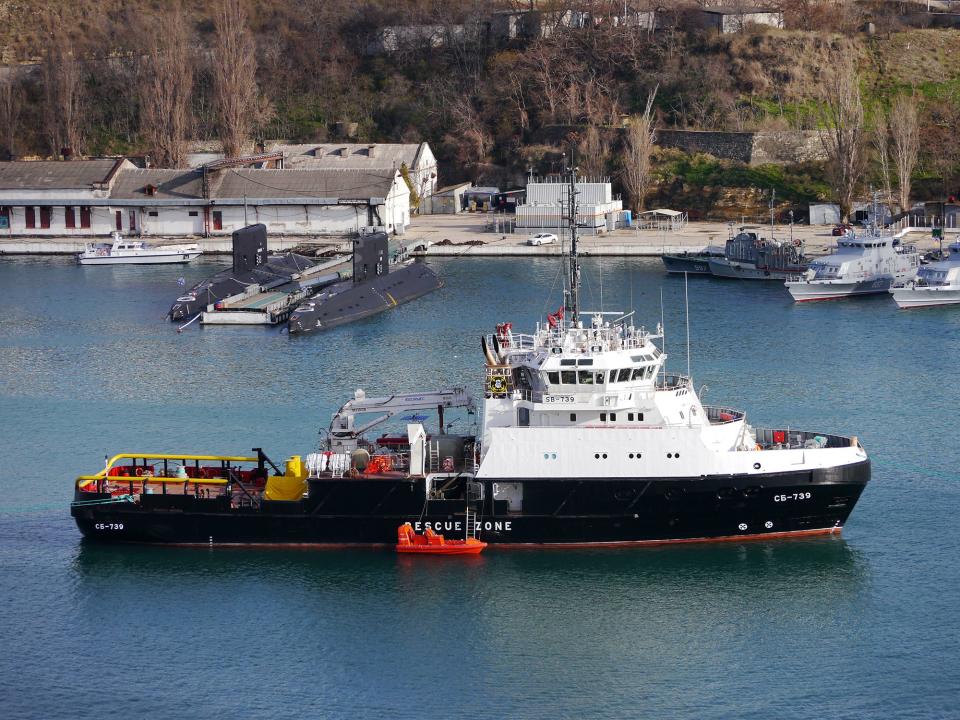

The Vasily Bekh, a Russian rescue tugboat, joined the Black Sea Fleet in 2017, to provide emergency rescue, tow ships, evacuate maritime crews, and conduct diving operations and survey work. The Russian tugboat was also used to transport ammunition, weapons, and personnel to Snake Island.
But the Russian rescue tug’s time in the fleet ended on June 17, 2022. Ukrainian forces said that they struck and “successfully demilitarized” the Vasily Bekh with two Harpoon anti-ship missiles. The attack marked the first time that Ukraine hit a Russian vessel with Western-supplied anti-ship weapons.
October 29, 2022: The Ivan Golubets


The Russian minesweeper Ivan Golubets was reportedly damaged in a “massive attack” on Sevastopol, a key Russian port on the Crimean peninsula.
On October 29, Ukrainian forces launched nine unmanned aerial vehicles and seven naval drones, according to the Russian Defense Ministry.
Russia claimed the minesweeper only sustained “minor damage,” but a senior Ukrainian official told The New York Times that it appears the ship was critically damaged — possibly beyond repair.
Internal Russian reports detailed damage to the Ivan’s hull, Forbes reported. Video footage posted to social media by Anton Gerashchenko, then an advisor to Ukraine’s minister of internal affairs, captured explosions lighting up the dark sky in Sevastopol harbor.
August 4, 2023: The Olenegorskiy Gornyak
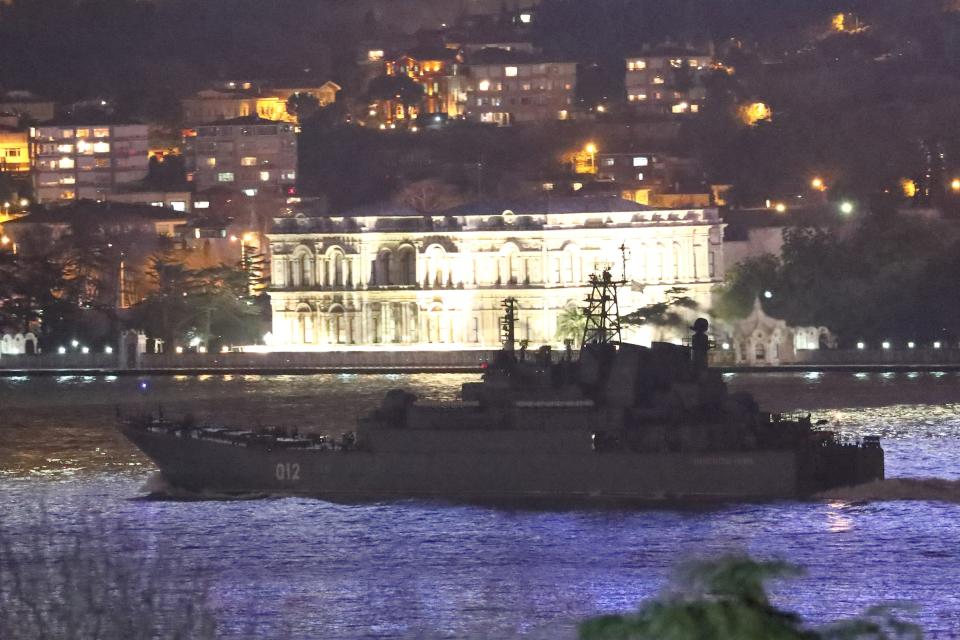

The Ropucha-class tank landing ship Olenegorskiy Gornyak was designed to quickly unload cargo and transport amphibious forces to land. At 360 feet long, Ropucha-class warships can land up to 10 battle tanks and carry up to 350 troops.
On August 4, 2023, the Russian warship was left badly damaged after it was struck by a Ukrainian sea drone armed with explosives — the first of many ships to fall to attack drones that could reach warships out of missile range. Russia acknowledged the attack but claimed that the Olenegorskiy Gornyak was left unharmed. Video footage of the attack suggested otherwise, though.
In the video, the sea drone can be seen zooming toward the landing ship and slamming into the side of it before the feed cuts off after detonating. In the aftermath, the ship was seen listing dangerously in the water.
September 13, 2023: The Minsk


A little over a month later, another Ropucha-class landing vessel was struck on September 13, 2023, while in dry-dock undergoing maintenance at the Sevmorzadov shipyard in Russian-occupied Crimea.
Open-source imagery of the aftermath showed that the Minsk had “almost certainly been functionally destroyed,” the UK Ministry of Defense said. A month later, satellite imagery reportedly showed the Minsk had been dismantled.
“The Minsk may be disassembled for spare parts, if there are any left there at all,” Ukrainian Navy spokesman Pletenchuk said.
September 13, 2023: The Rostov-on-Don
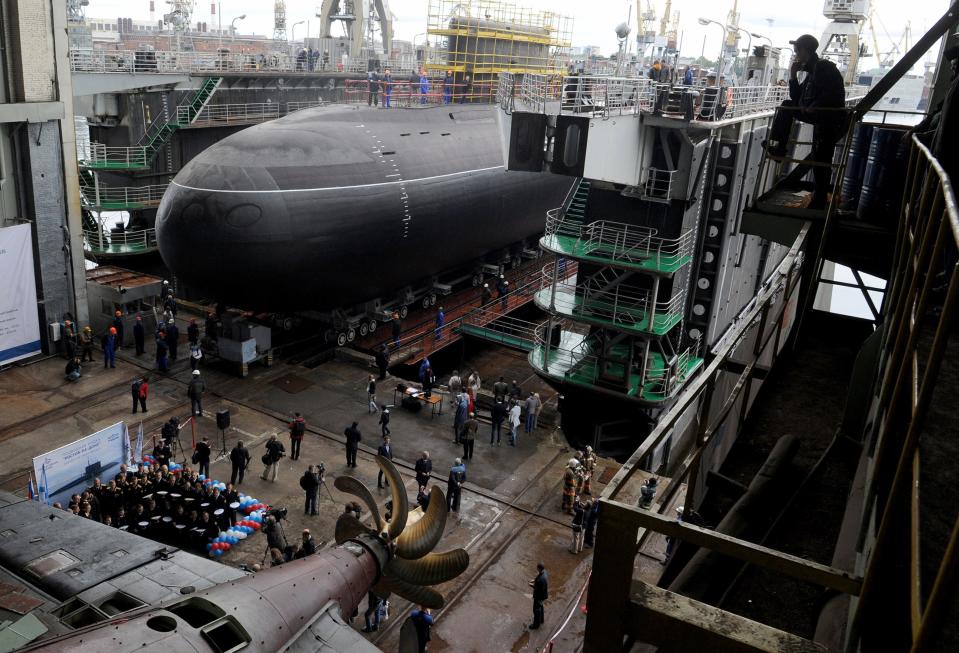

Along with the Minsk, the improved Kilo-class submarine Rostov-on-Don also “suffered catastrophic damage,” the UK Defense Ministry said in an intelligence report. The submarine was also undergoing repairs at the Sevmorzadov shipyard when the Ukrainians attacked.
“Any effort to return the submarine to service is likely to take many years and cost hundreds of millions of dollars,” the ministry continued.
CIT received exclusive photos of the damaged Russian submarine Rostov-on-Don. They indicate she received two hits, one of which is not visible from the satellite imagery.
1/2 pic.twitter.com/pYJ5n4n07H
— CIT (en) (@CITeam_en) September 18, 2023
November 4, 2023: The Askold
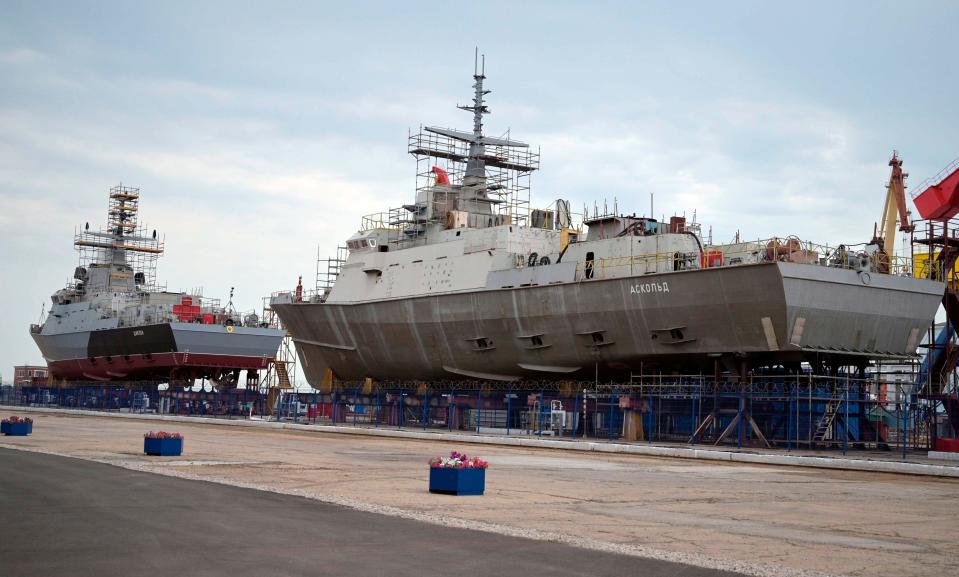

The Russian Navy also lost one of its brand-new warships before it had the chance to even join the Black Sea Fleet.
Lt. Gen. Mykola Oleshchuk, commander of Ukraine’s Air Force, said Ukrainian forces targeted the Zaliv shipyard in Russian-occupied Crimea, causing significant damage to the Project 22800 Karakurt-class corvette Askold.
Less than a week later, two more Russian vessels — a Serna-class landing craft and an Akula-class small landing ship — were struck by Ukrainian sea drones, though it was not immediately clear which ships were targeted.
Russian media publish a video from Kerch in temporarily occupied Crimea.
Information also appeared that there were at least three strikes on Askold, a Rusaian small missile ship that was to the south of Kerch.
Waiting for official confirmation. pic.twitter.com/bDJJjWoUgZ
— Anton Gerashchenko (@Gerashchenko_en) November 4, 2023
December 26, 2023: The Novocherkassk


To cap off a devastating year for the Russian Navy, Ukrainian forces launched guided missiles at the Ropucha-class landing ship, the Novocherkassk, near the town of Feodosiya in Russian-occupied Crimea in December 2023.
“Russia’s fleet is getting smaller and smaller!” Oleshchuk, the Ukrainian air force commander, wrote in a post on Telegram along with footage of the explosion.
A Russian-appointed governor claimed only one person was killed and that just two were injured in the attack, an unlikely outcome since the ship has a crew of about 100 service members. Independent Russian journalists reported dozens were wounded or missing.
January 31, 2024: The Ivanovets
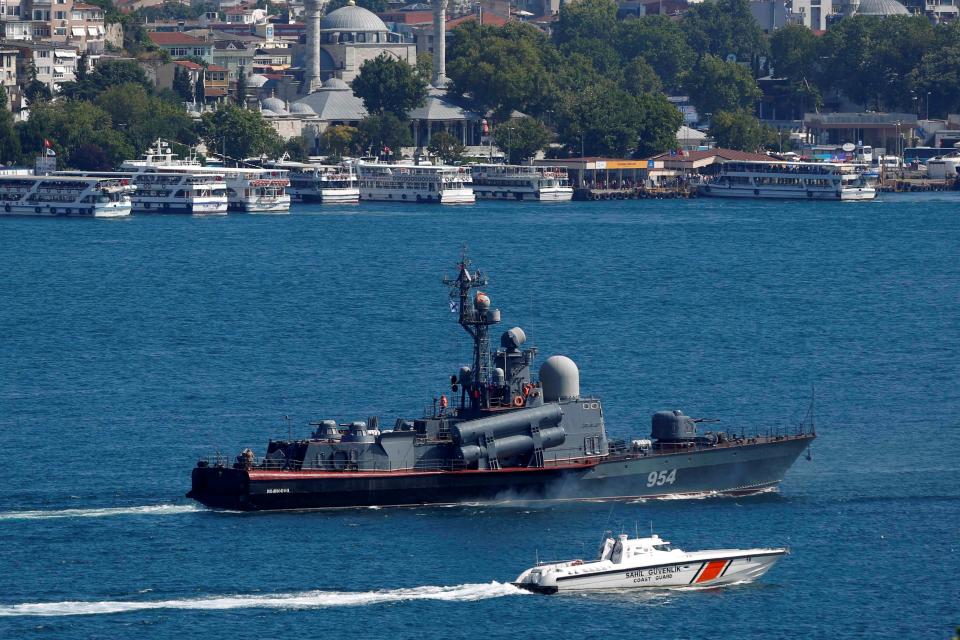

In an overnight operation on January 31, a Ukrainian special military unit sank a small warship, the Ivanovets, with six satellite-controlled naval drones powered by Jet Skis.
The Ivanovets was a Tarantul-class missile corvette armed with supersonic anti-ship missiles and anti-aircraft missiles.
Video shared by the Defense Intelligence of Ukraine appears to show the drone approaching the Ivanovets. Following a massive explosion, the Russian vessel can be seen listing aggressively before descending stern-first into the water.
February 14, 2024: The Caesar Kunikov
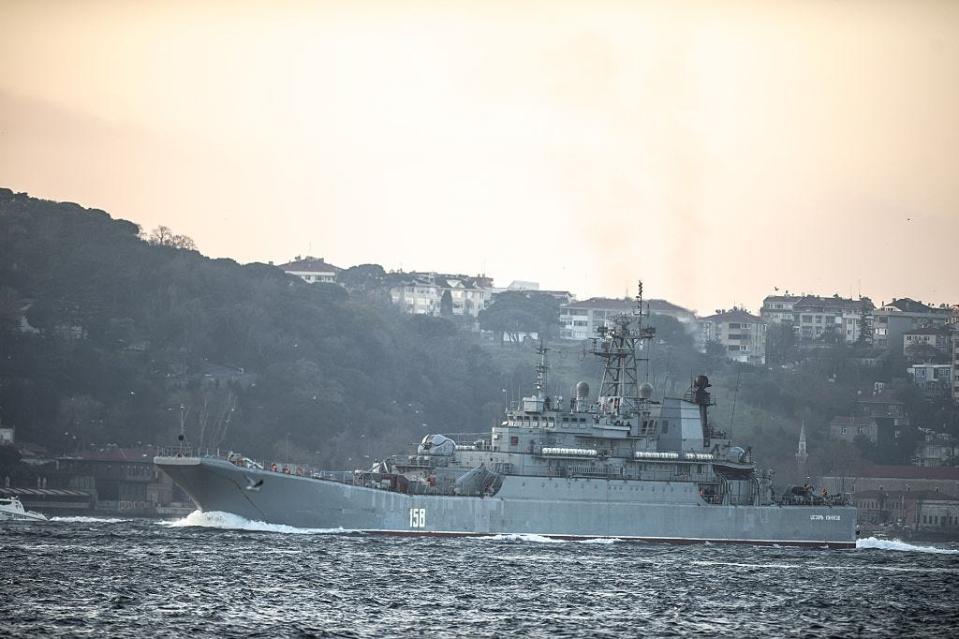

Ukraine continued its kill streak less than a month later, sinking the Russian landing ship, the Caesar Kunikov, on February 14 with inexpensive sea drones.
In a weird twist of fate, the Ropucha-class warship was named after a Soviet naval officer who was killed on February 14, 1943 — exactly 81 years before the warship bearing his namesake was sunk by Ukrainian MAGURA drones.
According to the Ukrainian Armed Forces’ general staff, the Caesar was near Alupka, a resort city in Crimea, just miles away from Russian President Vladimir Putin’s Olivye palace complex.
Video footage of the attack captured Ukraine’s naval drones approaching the Caesar as the crew aboard the ship desperately attempted to defend the landing ship with machine guns. Following a large explosion, the video shows what appears to be a large hole in the side of the ship.
March 5, 2024: The Sergey Kotov


Some Russian warships have taken more than one attempt to sink, like the Russian patrol ship Sergey Kotov.
Ukrainian forces attacked the $65 million vessel three times — in July, August, and September 2023 — before Ukraine’s drones successfully sank it on the morning of March 5, 2024.
Russia was planning to use the Kotov as an anti-aircraft missile platform, Andrii Yusov, a Ukrainian intelligence official, told Radio Free Europe.
Video of the attack showed the warship attempting to flee from the exploding sea drones in pursuit. The footage also captured the vessel’s crews trying — and failing — to stop the drones with a heavy amount of gunfire.
According to Ukraine’s Main Directorate of Intelligence, the Kotov “sustained damage to the stern, starboard, and port sides.” At least 13 Russian sailors were killed, and 52 had to be medically evacuated, according to Ukraine.
March 24, 2024: The Yamal and the Azov
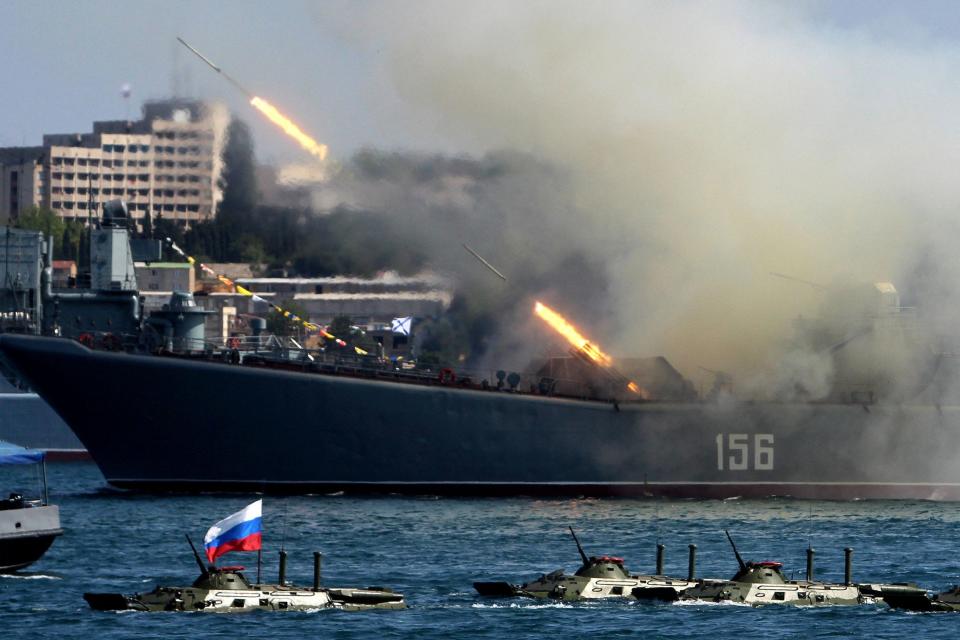

Russia’s Black Sea fleet took another devastating blow in late March when Ukrainian Armed Forces claimed to have damaged two of Russia’s large landing ships in Crimea.
On March 23, Ukrainian forces attacked the Yamal and the Azov — both of which underwent repair in the shipyard just two years prior — in Sevastopol, Russia’s major Black Sea port in Crimea.
The attack also targeted a Russian military communications center using at least three Storm Shadow cruise missiles, according to OSINTtechnical project.
In a post on Telegram, Mikhail Razvozhayev, the Russian-appointed head of Sevastopol, described the attack as “the largest in recent times.”
March 24, 2024: The Ivan Khurs


At first, Ukraine only said the strikes on Russian warships at the end of March damaged the Yamal and the Azov. But two days later, Ukraine’s military said two more Russian navy vessels were also struck, including the Ivan Khurs, a Yury Ivanov-class intelligence ship.
Launched in 2017, the Ivan Khurs is one of Russia’s most sophisticated vessels, making it a prime target for Ukraine to further disable the Black Sea fleet. It is fitted with radar warning receivers and electronic eavesdropping gear and armed with machine guns and mobile air defense systems.
Open-source analysts posted satellite images on Telegram of apparent damage to the Russian spy ship after the Ukrainian missile strike on Sevastopol.
“As for the Ivan Khurs ship, we can confirm the damage to the reconnaissance equipment,” Navy spokesman Dmytro Pletenchuk said, according to Ukrainian media outlet Militarnyi. “That is, in fact, now it is not combat-ready, it cannot perform its intended tasks.”
The Ukrainian navy targeted the Ivan Khurs less than a year prior to the March attack. In May 2023, Ukraine launched three explosive-laden sea drones toward the 4,000-ton reconnaissance vessel, which was sailing 75 miles northeast of the Bosphorus Strait.
While the drones got close to the Ivan Khurs and detonated, the ship sustained little to no damage and continued to operate in the western Black Sea, where it was protecting two key pipelines carrying gas from Russia to Turkey.
March 26, 2024: The Konstantin Olshansky
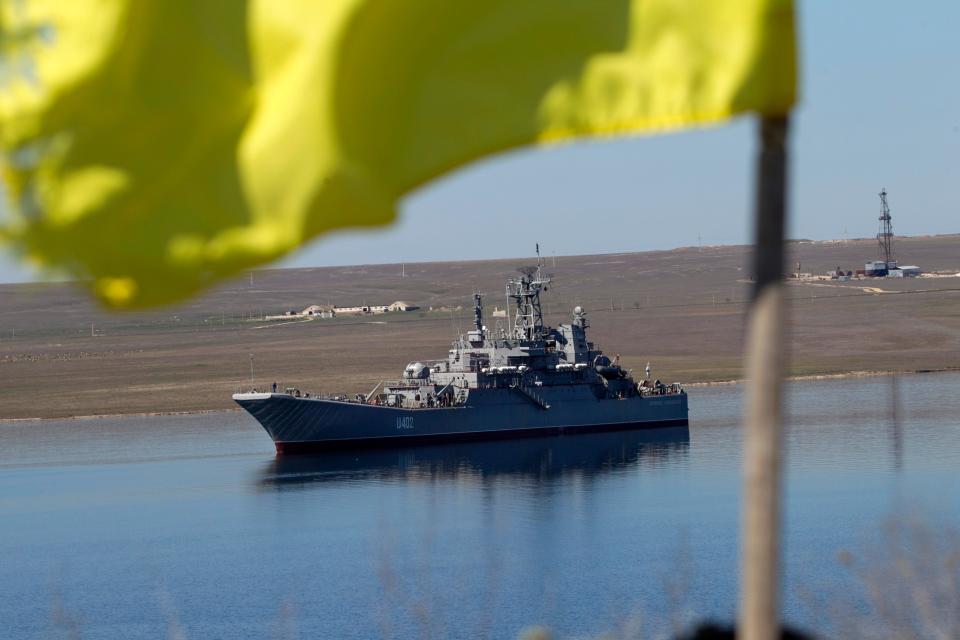

The large landing ship Konstantin Olshansky was also caught in the massive missile attack on Sevastopol. The decades-old vessel formerly belonged to Ukraine before it was seized along with much of the Ukrainian navy by Russian forces during its illegal annexation of Crimea in 2014.
Ukraine attacked its former warship using a Neptune anti-ship missile, and the navy said “damage was definitely done” to the amphibious assault ship and “it is not combat-ready now.”
“Justice has been restored,” the Ukrainian defense ministry wrote on social media.
Pletenchuk told Ukraine’s Freedom TV that the former Ukrainian vessel was moored in Sevastopol Bay for nearly a decade, being dismantled for parts, but Russian forces decided to restore it because they were running out of landing ships.
“Within a year, it was restored, but the purpose of these works was to create a falsification in order to report to the Moscow leadership on how they had restored one of their allegedly ‘own’ large landing ships,” the navy spokesman said in March. “This ship was to be used against Ukraine. Therefore, it was decided to hit this vessel with our Neptune.”
May 19, 2024: The Kovrovets
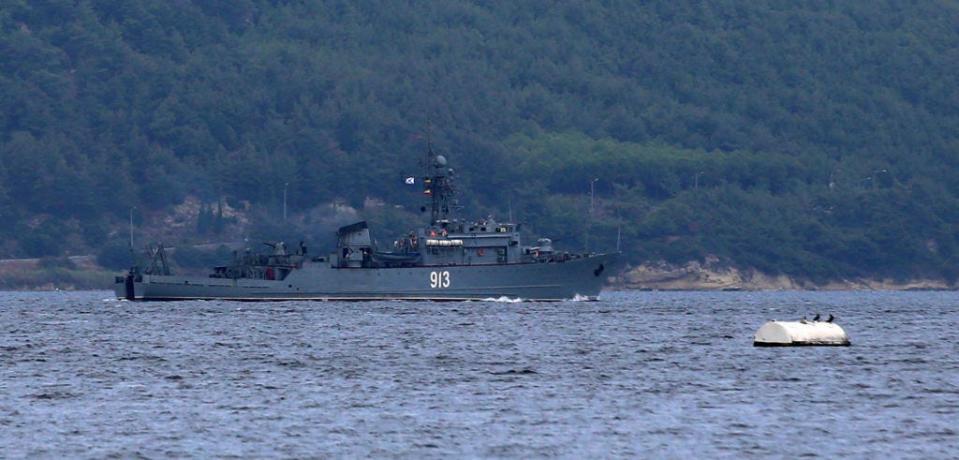

In the latest of Ukraine’s string of attacks against the Black Sea Fleet, Ukraine reported it destroyed the Project 266M Akvamarin-class minesweeper Kovrovets in an overnight attack over the weekend in the port of Sevastopol.
The Soviet-era vessel could detect mines at depths up to nearly 500 feet and was armed with two 30mm AK-230M naval guns. It featured a high-resolution Lynx radar system.
“The Naval Forces of the Armed Forces of Ukraine, together with their comrades, continue to bring us closer to victory,” the Ukrainian Navy wrote on Telegram.
No information has been released publicly on the Russian sea minesweeper’s exact location nor what weapons were used in the attack.
“Another bad day for the russian Black Sea Fleet,” Ukraine’s Defense Ministry wrote in a post on X.
May 20, 2024: The Tsiklon
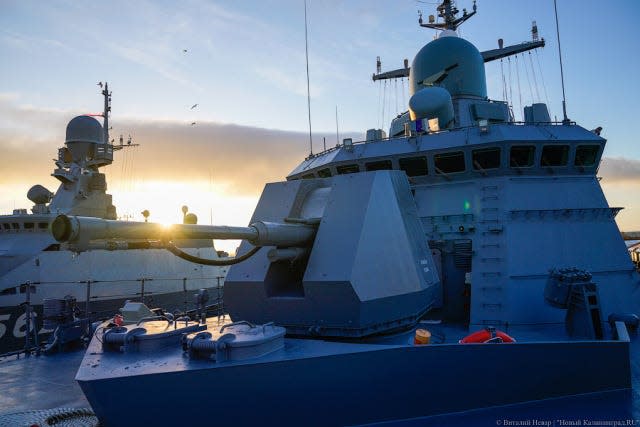

One of Russia’s most significant losses in its Black Sea fleet also came this past weekend, when Ukraine’s navy said it took out the Tsiklon, Russia’s last cruise missile carrier based out of Crimea.
The Karakurt-class missile corvette entered service with the Black Sea fleet less than a year ago, in July 2023. It was launched just three years prior at Zalyv Shipyard in Kerch, Crimea.
Ukrainian navy spokesperson Dymtro Pletenchuk said the brand-new corvette never fired a cruise missile while on active service, Reuters reported.
The corvette is capable of launching cruise missiles at sea and ground targets up to 1,500 miles away, according to KCHF.ru, a Russian site covering the Black Sea Fleet.
While Ukrainian forces continue to assess the damage sustained by the small missile carrier, satellite imagery shared on social media appeared to show the sunken Tsiklon.
Pletenchuk told Radio Free Europe Monday that there was a “fairly high probability that there is now not a single carrier of cruise missiles in Crimea.”
Editor’s note: This list was first published in February 2024 and has been updated to reflect recent developments.
Read the original article on Business Insider
Source Agencies


